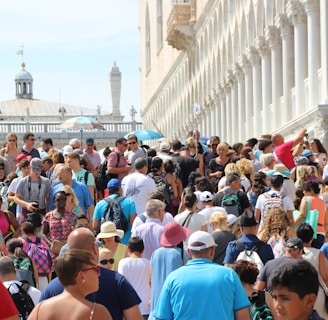Overtourism: A Growing Problem and How to Avoid It
Overtourism is a growing problem that is having a negative impact on destinations around the world. This blog post explains what over tourism is, its causes and effects, and how to avoid it, with a focus on green goods.
9/18/20235 min read


Introduction
Overtourism is a term used to describe the negative impacts of tourism on a destination. It can occur when a destination receives more tourists than it can handle, leading to problems such as environmental damage, congestion, increased prices, and loss of local culture.
Overtourism is a complex issue with a variety of causes and effects. Some of the key causes of overtourism include:
The rise of low-cost travel: Low-cost airlines and accommodation have made it easier for people to travel to popular destinations, which has led to an increase in the number of tourists.
The growth of social media: social media has made it easier for people to share their travel experiences with others, which has led to increased demand for popular tourist destinations.
The popularity of certain destinations: Some destinations are simply more popular than others, which can lead to overtourism.
The lack of planning and management by tourism destinations: Many tourism destinations are not adequately prepared to deal with the large number of tourists that they receive.
Overtourism can have a number of negative effects on destinations, including:
Environmental damage: Overtourism can lead to pollution, overcrowding, and damage to natural and cultural heritage sites.
Congestion: Overtourism can cause congestion on roads, public transportation, and at popular tourist attractions.
Increased prices: Overtourism can lead to increased prices for goods and services, including accommodation, food, and transportation.
Loss of local culture: Overtourism can lead to the loss of local culture and traditions, as destinations become more commercialized and cater to the needs of tourists.
How to Avoid Overtourism
There are a number of things that travelers can do to avoid overtourism, including:
Travel during the off-season: Traveling during the off-season can help to reduce the number of tourists at a destination.
Visit less popular destinations: Visiting less popular destinations can help to spread the benefits of tourism more evenly.
Support local businesses: Supporting local businesses can help to boost the local economy and reduce reliance on tourism.
Be respectful of the environment and local culture: Travelers should be respectful of the environment and local culture when visiting a destination. This means avoiding littering, being mindful of noise levels, and dressing appropriately.
Here are some stats and data from India and around the world regarding overtourism:
India
India is one of the top 10 most visited countries in the world.
In 2019, India received over 10.9 million foreign tourist arrivals.
Over the past decade, the number of foreign tourist arrivals to India has increased by an average of 10% per year.
The most popular tourist destinations in India include the Taj Mahal, the Golden Temple of Amritsar, and the beaches of Goa.
Overtourism is a growing problem in India, particularly in popular tourist destinations such as Agra, Amritsar, and Goa.
World
In 2019, there were 1.5 billion international tourist arrivals worldwide.
This is up from 1 billion international tourist arrivals in 2010.
The growth of tourism has been driven by a number of factors, including the rise of low-cost travel and the growth of social media.
Over tourism is a growing problem in many popular tourist destinations around the world, including Barcelona, Venice, and Santorini.
Impact of Overtourism
Over tourism can have a number of negative impacts on destinations, including:
Environmental damage: Over tourism can lead to pollution, overcrowding, and damage to natural and cultural heritage sites.
Congestion: Over tourism can cause congestion on roads, public transportation, and at popular tourist attractions.
Increased prices: Over tourism can lead to increased prices for goods and services, including accommodation, food, and transportation.
Loss of local culture: Over tourism can lead to the loss of local culture and traditions, as destinations become more commercialized and cater to the needs of tourists.
What Can Be Done to Address Over tourism?
There are a number of things that can be done to address over tourism, including:
Better management of tourism destinations: Governments and tourism authorities need to better manage tourism destinations to ensure that they are able to handle the number of tourists they receive. This includes developing infrastructure to support tourism, such as public transportation and waste management.
Promotion of less popular tourist destinations: Governments and tourism authorities need to promote less popular tourist destinations to help spread the benefits of tourism more evenly.
Education of travelers: Travelers need to be educated about the negative impacts of overtourism and how they can help to reduce it. This includes encouraging travelers to travel during the off-season, visit less popular destinations, and support local businesses.
By taking these steps, we can help to reduce the negative impacts of overtourism and ensure that tourism is a sustainable and beneficial activity for both travelers and destinations.
Green Goods Guide
Green goods are products that are produced in a sustainable way. They can help to reduce our impact on the planet and contribute to the SDGs.
Here are some specific examples of green goods that travelers can purchase to help reduce overtourism:
Locally produced souvenirs: Buying locally produced souvenirs helps to support the local economy and reduce the environmental impact of transportation. For example, instead of buying a souvenir from a chain store, travelers could buy a souvenir from a local artisan.
Sustainable travel accessories: Sustainable travel accessories, such as reusable water bottles and shopping bags, can help to reduce waste and pollution. For example, travelers could bring their own reusable water bottle instead of buying bottled water.
Fair trade goods: Fair trade goods are produced in a way that benefits the workers who produce them. Buying fair trade goods can help to ensure that tourism is beneficial for both the destination and the local community. For example, travelers could buy fair trade coffee or chocolate.
Conclusion
Overtourism is a growing problem, but there are a number of things that travelers can do to avoid it. By traveling during the off-season, visiting less popular destinations, supporting local businesses, and being respectful of the environment and local culture, travelers can help to minimize the negative impacts of tourism.
Travelers can also help to reduce overtourism by purchasing green goods. By buying locally produced souvenirs, sustainable travel accessories, and fair trade goods, travelers can support the local economy and reduce the negative impacts of tourism.
In addition to the above, here are some other ways that travelers can help to reduce overtourism:
Be mindful of their travel footprint: Travelers can reduce their travel footprint by choosing sustainable transportation options, such as public transportation or walking. Travelers can also reduce their environmental impact by staying in eco-friendly accommodations and eating at sustainable restaurants.
Educate themselves about the destination: Travelers can learn about the destination they are visiting before they go. This will help them to understand the local culture and environment, and to be more respectful of the destination.
Become a responsible traveler: Travelers can become responsible travelers by being mindful of their impact on the destination and by supporting local businesses.
By taking these steps, travelers can help to reduce overtourism
overtourism
sustainable tourism
responsible tourism
green tourism
ecotourism
overtourism causes
overtourism effects
how to avoid overtourism
green goods
sustainable travel accessories
fair trade goods
locally produced souvenirs
eco-friendly accommodations
sustainable restaurants
travel footprint
responsible travel
